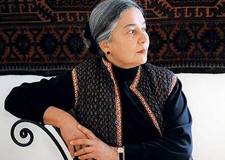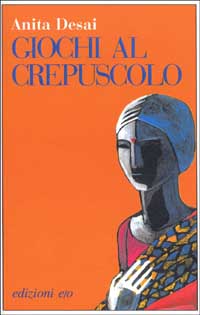|

Anita Desai (n. 1937)
Nata a Mussorie in India nel 1937 da madre tedesca e padre bengalese, Anita Desai è cresciuta e ha studiato a Delhi. Vive tra l’India e gli Stati Uniti, dove insegna, ed è fra le massime voci della narrativa indiana contemporanea. Nell’arco di oltre venticinque anni ha scritto, in inglese, otto romanzi, un’antologia di racconti e tre libri per bambini. Celebre e acclamata in India, si è imposta con successo fra pubblico e critica in Inghilterra e negli Stati Uniti; ha vinto ambiti premi letterari a Londra e a Delhi.
Bibliografia
Il villaggio vicino al mare, SEI, 1987
In custodia, La Tartaruga, 1990
Nord Sud Est Ovest, Linea d'Ombra, 1991
Notte e nebbia a Bombay, La Tartaruga, 1992
Fuoco sulla montagna, Donzelli, 1993
Giochi al crepuscolo, E/O, 1996
Chiara luce del giorno, Einaudi, 1999
Digiunare, divorare, Einaudi, 2001
Il villaggio sul mare, Einaudi, 2002
Polvere di diamante e altri racconti, Einaudi, 2003
Viaggio a Itaca, Einaudi, 2005
Fuoco sulla montagna, Einaudi, 2006
Anita Desai (b. 1937) - formerly Anita Mazumdar
Indian novelist and short story writer, especially noted for her sensitive portrayal of the inner life of her female characters. Several of Desai's novels explore tensions between family members and the alienation of middle-class women. In her later novels Desai has dealt with such themes as German anti-Semitism, the demise of traditions, and Western stereotypical views of India.
"Even though his cigarette stank - it was a local one, wrapped in a tendu leaf, fierce enough to make his head swim - he could smell the distinctive Indian odour - of dung, both of cattle and men, of smoke from the village hearts, of cattle food and cattle urine, of dust, of pungent food cooking, of old ragged clothes washed without soap and put out to dry, the aroma of poverty." (from Baumgartner's Bombay, 1988)
Anita Desai was born in Mussoorie, a hill station north of Delhi, as the daughter of a D.N. Mazumdar, a Bengali businessman, and the former Toni Nime, of German origin. She began to write in English at the age of seven, and published her first story at the age of nine. Desai was educated in Delhi at Queen Mary's Higher Secondary School and Miranda House, Delhi University, where she received in 1957 a B.A. in English literature. In the following year she married Ashvin Desai, a businessman; they had four children.
As a novelist Desai made her debut in 1963 with The Peacock. She had started to write short stories regularly before her marriage. The Peacock was published in Britain by Peter Owen, a publisher specializing in literature of the British Commonwealth and continental Europe. In was followed by Voices of the City (1965), a story about three siblings, Amla, Nirode, and Monisha, and their different ways of life in Calcutta. Amla sees the city as a monster, Nirode sacrifices everything for her career, and Monisha cannot bear her stifling existence in the household of a wealthy old Calcutta family . Fire on the Mountain (1977), set in Kasuli, a hill station, focused on three women and their complex experiences in life.
"'No one, said Bim, slowly and precisely, 'comprehends better than children do. No one feels the atmosphere more keenly - or catches the nuances, all the insinuations in the air - or notes those details that escape elders because their senses have atrophied, or calcified.'" (from Clear Light of Day, 1980)
In Clear Light of Day (1980) Desai wove the history of Delhi with a middle-class Hindu family. The central character is Bim (short for Bimla) Das, a history professor, an independent woman. Bim's memories of the family past dominate her sterile existence, she feels betrayed by her unambitious sister Tara, and replays her memories in the decaying family mansion in Old Delhi. Their mentally retarded brother-in-law plays old records. Tara do not understand why Bim doesn't want anything to change, when she rejects the hopeless atmosphere of the house. "It seemed to her that the dullness and the boredom of her childhood, her youth, were stored here in the room under the worn dusty red rugs, in the bloated brassware, amongst the dried grasses in the swollen vases, behind the yellowed photographs in the oval frames - everything, everything that she had so hated as a child and that was still preserved here as if this were the storeroom of some dull, uninviting provincial museum." The summer of 1947 has divided the nation and the family - Hindus and Muslims are torn apart by Partition. Through Tara's and Bim's consciousness Desai examines the same events from different points of views.
The author's characters in many novels are members of the Anglicized Indian bourgeoisie, whose marital problems are in the forefront. Her characters often adopt escapist ways to cope with the boring everyday life or world outside comfortable living. In Where Shall We Go This Summer? (1975) Sita, pregnant with her fifth child, takes refuge from her marriage on the magical island homestead of her deceased father. Nanda Kaul in Fire on the Mountain withdraws into a private world of self-willed isolation. Desai has commented on her work: "My novels are no reflection of Indian society, politics or character. They are my private attempt to seize upon the raw material of life." In The Zigzag Way (2004), Desai departed from her familar territories and set the story of identity and self-discovery in Mexico.
In the mid-1980s Desai started to look more closely the life of the unprivileged. In Custody (1984) is Desai's ironic story about literary traditions and academic illusions. The central characters are Nur, an Urhi poet, who has fallen on hard times, and Deven, a professor of Hindi, who realizes that the beloved poet is not the magical genius he has imagined.
The author's own German half of the parental heritage is in the background of Baumgartner's Bombay (1988) - Desai's first language was German. In the story a retired Jewish businessman has escaped in his youth the Nazis to India and stayed there in poverty, taking care of stray cats. "His eyes were short-sighted and blinked half-shut against the glare that thrust itself in at the door and so he did not notice that watchman's expression as he passed him on his perch under the wooden board that bore the tenants' names - Hiramani, Taraporevala, Barodekar, Coelho, da Silva, Patel - mumbled 'Good morning, salaam', and went down the steps into the street with his bag, uncertain as ever of which language to employ. After fifty years, still uncertain, Baumgartner, du Dummkopf." A German hippie enters Baumgartner's life and his reclusive existence is shattered. In both of these books Desai has given her answer to critics, who have concluded that her characters are usually westernized middle-class professionals and therefore their problems are more close to those of Western readers than to majority of Indian people. In Journey to Ithaca (1995) Desai examined the nature of pilgrimage to India through three characters - Mateo and Sophie, young Europeans, and Mother, a charismatic and mysterious woman, whose story is an earlier version of their own. Desai's perspective on India is more European than in his earlier works. Fasting, Feasting (1999) contrasted American and Indian culture, and male and female roles. Arun studies in Massachusetts, his sister Uma lives in India in a small provincial city. Uma lives with her parent whom she calls MamaPapa. "It was hard to believe they had ever had separate existence, that they had been separate entities and not MamaPapa in one breath... MamaPapa themselves rarely spoke of a time when they were not one. The few anecdotes they related separately acquired great significance because of their rarity, their singularity." Uma's attempts to leave home and marry create a disaster. The novel was a finalist for the 1999 Booker Prize.
"Poor Raman was placed in one of the lower ranks of the companies's hierarchy. That is, he did not belong to a British concern, or even to an American-collaboration one, but merely to an Indian one. Oh, a long-established, prosperous and solid one but, still, only Indian. Those cigarettes that he passed around were made by his own company. Somehow it struck a note of bad taste amongst these fastidious men who played golf, danced at the club on Independence Eve and New Year's Eve, invited at least one foreign couple to every party and called their decorative wives 'darling' when in public." (from 'The Farewell Party' in Games at Twilight, 1978)
Since the 1950s Desai has lived in New Delhi, Calcutta, Bombay, and other Indian cities. She has been a member of the Advisory Board for English of the National Academy of Letters in Delhi and a Member of the American Academy of Arts and Letters. She has taught at Girton College and Smith College in England, and at Mount Holyoke College in the United States. In 1993 she became a creative writing teacher at Massachusetts Institute of Technology. She has spent there for one semester each year and the rest of her time in India. Desai is a Fellow of the Royal Society of Literature in London. She received the Guardian Award for Children's Fiction for the novel The Village by the Sea (1982), and the 1978 National Academy of Letters Award for Fire on the Mountain.
For further reading: Encyclopedia of World Literature in the 20th Century, vol. 1 ed. by Steven R. Serafin (1999); Novels of Anita Desai by Sandhyarani Dash (1997); Five Indian Novelists; B. Rajan, Raja Rao, R.K. Narayan, Arun Joshi, Anita Desai by V.V.N. Rajendra Prasad (1997); Cultural Imperialism and the Indo-English Novel: Genre and Ideology in R.K. Narayan, Anita Desai, Kamala Markandaya, and Salman Rushdie by Fawzia Afzal-Khan (1993); Anita Desai's Fiction by M. Solanki (1993); Symbolism in Anita Desai's Novels by K. Sharma (1992); Virginia Woolf and Anita Desai by A. Kanwar (1989); Voice and Vision of Anita Desai by S. Jena (1989); The Novels of Anita Desai by U. Bande (1988); Stairs to the Attic by J. Jain (1987); Perspectives on Anita Desai by R.K. Sarivastava (1984); Anita Desai the Novelist by M. Prasad (1981); Anita Desai by R.S. Sharma (1981); The Novels of Mrs. Anita Desai by B. Ramachandra Rao (1977) - see also: Anita Desai home page; Anita Desai: a Profile; Intialaisia naiskirjailijoita
Selected works:
The Peacock, 1963
Voices in the City, 1965
Bye-Bye, Blackbird, 1971
The Peacock Garden, 1974
Where Shall We Go This Summer?, 1975
Cat on a Houseboat, 1976
Fire on the Mountain, 1977
Games at Twilight and Other Stories, 1978
Clear Light of Day, 1980
Village by the Sea, 1982
In Custody, 1984 - film 1993, dir. by Ismail Merchant, starring Shashi Kapoor, Shabana Azmi, Om Puri, screenplay by Anita Desai
Baumgartner's Bombay, 1988
Journey to Ithaca, 1996
Fasting, Feasting, 1999
Diamond Dust, 2000
The Zigzag Way: A Novel, 2004 |



 Giochi al crepuscolo
Giochi al crepuscolo
